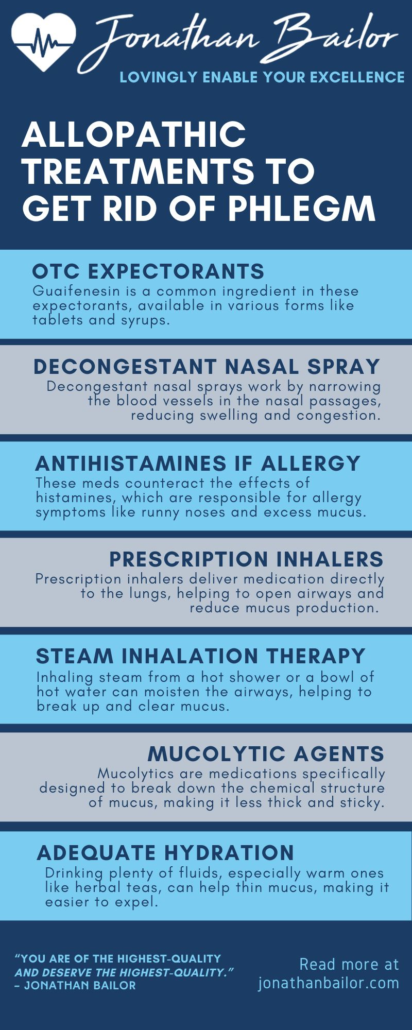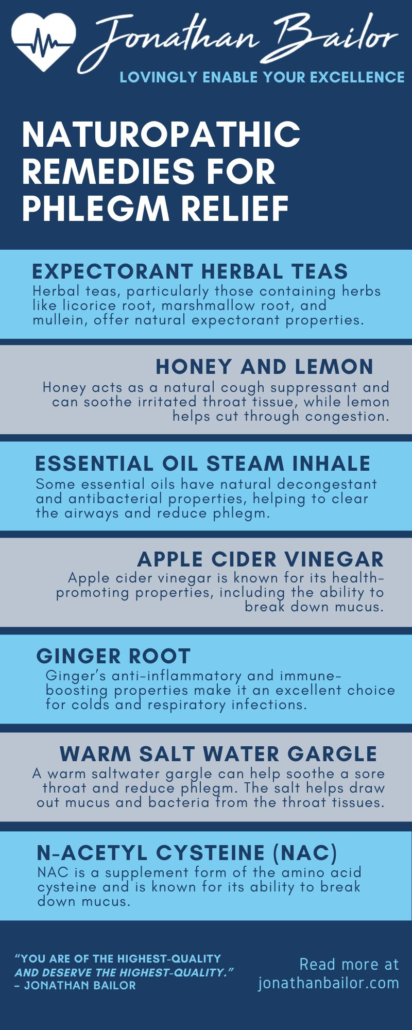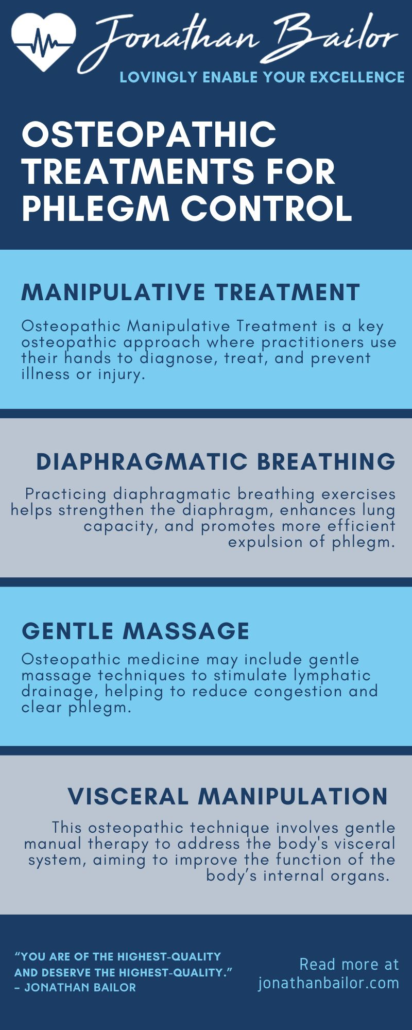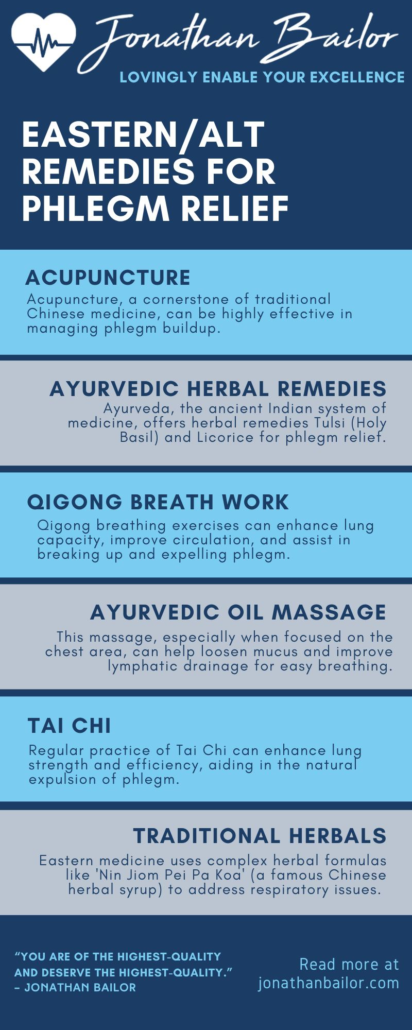24 Proven Treatments That Help to Get Rid of Phlegm
Her are 24 proven treatments that help to get rid of phlegm in this jam packed coughing and phlegm article with Jonathan Bailor!
As the cold season wraps its chilly fingers around us, a familiar yet unwelcome guest often arrives: the persistent build-up of phlegm. The common cold is a seasonal struggle that many face, along with a runny nose, a sore throat, and a persistent cough. But the good news is that effective, evidence-based treatments are within reach. This guide is crafted to empower you with knowledge and practical solutions, offering relief from the discomfort of phlegm buildup during these colder months.
Tackle more cough and phlegm with our 28 Habits for Minimizing Phlegm Build-Up During Cold Season Now and Later or Soothing Secrets: 28 Home Remedies for Persistent Cough at Every Stage next!
In this article, you’ll discover a series of proven strategies, each backed by scientific understanding and practical wisdom. These aren’t just quick fixes; they’re reliable methods to help clear that stubborn phlegm and make your days more comfortable. Imagine the relief of breathing freely again, without the constant irritation and cough that phlegm can bring.
While these treatments will be explored in detail throughout this article, the key lies in understanding your body’s needs and responding with the right approach. It’s about more than just managing symptoms; it’s about enhancing your overall respiratory health during the season when you need it most.
This guide is an invitation to delve into treatments that can genuinely make a difference. So, whether you’re seeking relief for yourself or looking for helpful advice to share with loved ones, this article is a valuable resource. It’s information worth sharing, for it can bring comfort and relief to many during the cold season.
Share this journey of discovery with friends, family, and on social media. Together, let’s navigate the cold season with ease and breathe a little easier.
Allopathic Solutions to Combat Phlegm During Cold Season
1. Over-the-Counter Expectorants
A practical and widely accessible allopathic solution is the use of over-the-counter expectorants. These medications work by keeping mucus thin (or thinning the phlegm), making it easier to cough up and clear from the respiratory tract. Guaifenesin is a common ingredient in these expectorants, available in various forms like tablets and syrups. Always follow the dosage instructions and consult a healthcare provider if symptoms persist.
2. Decongestant Nasal Sprays
Decongestant nasal sprays can offer immediate relief from nasal congestion that often accompanies phlegm buildup. These sprays work by narrowing the blood vessels in the nasal passages, reducing swelling and congestion. However, it’s crucial to use them as directed, as overuse can lead to rebound congestion.
3. Antihistamines for Allergy-Induced Phlegm
For phlegm caused by allergies, antihistamines can be an effective solution. These medications counteract the effects of histamines, which are responsible for allergy symptoms like runny noses and excess mucus production. Non-drowsy formulas are available for daytime use, ensuring that your daily activities aren’t hindered.
4. Prescription Inhalers
In cases where phlegm is linked with respiratory conditions like asthma or chronic bronchitis, doctors may prescribe inhalers. These deliver medication directly to the lungs, helping to open airways and reduce mucus production. Using inhalers as prescribed can significantly improve breathing and control phlegm production.
5. Steam Inhalation Therapy
Although simple, steam inhalation is an effective allopathic approach to loosening phlegm. Inhaling steam from a hot shower or a bowl of hot water can moisten the airways, helping to break up and clear mucus. This method is easy to do at home and can be enhanced with a saline nasal spray for better results.
6. Mucolytic Agents
Mucolytics are medications specifically designed to break down the chemical structure of mucus, making it less thick and sticky. This makes it easier to cough out phlegm. These mucus thinners are available by prescription and can be particularly helpful for individuals with conditions that produce thick mucus, such as cystic fibrosis.
7. Adequate Hydration
One of the most basic yet effective allopathic recommendations for common colds is to stay well-hydrated. Drinking plenty of fluids, especially warm ones like herbal teas, can help thin mucus, making it easier to expel. This approach is simple, safe, and can be easily integrated into your daily routine.
Remember, while these allopathic solutions are effective, it’s essential to consult with a healthcare professional for personalized advice and to ensure that these treatments align with your specific health needs.

Feeling Better Is Priceless, That's Why We Don't Put A Price On It!
“It’s Like A Free and Medically Valid Version of Noom and Weight Watchers Online”
~ Dr. Doctor Matthew Oleshiak, MD
Click the 'LEARN MORE' button below for free lifetime access to the fast fix program developed by Jonathan and top Ivy League Medical Doctors
LEARN MOREP.S. It's not a free trial. It's not part of the program for free. The entire program is free, forever, for real! No credit card needed.
Naturopathic Remedies for Phlegm Relief During Cold Season
1. Herbal Teas with Expectorant Properties
Herbal teas, particularly those containing herbs like licorice root, marshmallow root, and mullein, offer natural expectorant properties. These herbs help loosen phlegm and facilitate easier breathing. Enjoying a warm cup of herbal tea can also provide soothing hydration, which is essential for thinning mucus.
2. Honey and Lemon Concoction
A time-honored naturopathic remedy is a simple mixture of honey and lemon. Honey acts as a natural cough suppressant and can soothe irritated throat tissue, while lemon helps cut through congestion. This combination can be taken alone or added to herbal tea for added benefits.
Even though honey’s sweet benefits might help clear up that pesky phlegm, a word of caution for the tiny tots: keep honey off the menu for any little one under a year old. Why, you ask? Because this natural nectar could lead to infant botulism. It’s a rare but serious condition. So, let’s keep the honey for the grown-ups and older kids!
3. Essential Oil Steam Inhalation
Inhalation of steam infused with essential oils like eucalyptus, peppermint, or thyme can be beneficial. These oils have natural decongestant and antibacterial properties, helping to clear the airways and reduce phlegm. Simply add a few drops to hot water and inhale the steam, taking care to avoid direct contact with the hot liquid.
4. Apple Cider Vinegar
Apple cider vinegar is known for its health-promoting properties, including the ability to break down mucus. Mixing a tablespoon of apple cider vinegar with a glass of water and drinking it can help manage phlegm buildup. Its high acidity helps to thin out the mucus, making it easier to expel.
5. Ginger Root
Ginger is another powerful naturopathic remedy for reducing phlegm. Its anti-inflammatory and immune-boosting properties make it an excellent choice for colds and respiratory infections. Ginger can be consumed as a tea, chewed raw, or added to meals for its phlegm-reducing effects.
6. Warm Salt Water Gargle
Gargling with warm salt water can help soothe a sore throat and reduce phlegm. The salt helps draw out mucus and bacteria from the throat tissues. This simple yet effective practice can be done several times a day for relief.
7. NAC (N-Acetyl Cysteine) Supplements
NAC is a supplement form of the amino acid cysteine and is known for its ability to break down mucus. It can be especially helpful for people with chronic respiratory conditions. As a potent antioxidant, NAC also supports overall immune health.
Each of these naturopathic solutions offers a gentle, effective way to manage phlegm buildup. However, it’s always advisable to consult with a healthcare professional, especially if you have underlying health conditions or are taking other medications.

Osteopathic Approaches to Phlegm Management During Cold Season
1. Osteopathic Manipulative Treatment (OMT)
Osteopathic Manipulative Treatment is a key osteopathic approach where practitioners use their hands to diagnose, treat, and prevent illness or injury. For phlegm buildup, OMT can involve specific techniques to enhance lymphatic drainage and improve respiratory function, facilitating the clearing of mucus from the airways.
2. Diaphragmatic Breathing Exercises
Osteopathic medicine emphasizes the importance of proper diaphragmatic breathing for respiratory health. Practicing diaphragmatic breathing exercises helps strengthen the diaphragm, enhances lung capacity, and promotes more efficient expulsion of phlegm. This technique not only aids in clearing mucus but also improves overall oxygenation and respiratory efficiency.
3. Gentle Massage for Lymphatic Drainage
Osteopathic medicine may include gentle massage techniques to stimulate lymphatic drainage, helping to reduce congestion and clear phlegm. These massage techniques, focused around the neck, chest, and back, can enhance circulation and aid in the removal of waste products and excess fluids from the body.
4. Visceral Manipulation
This osteopathic technique involves gentle manual therapy to address the body’s visceral system, aiming to improve the function of internal organs. For respiratory issues, visceral manipulation can focus on the lungs and diaphragm, enhancing their movement and function, thus aiding in the management of phlegm.
These osteopathic solutions offer a holistic approach to managing phlegm, focusing on the body’s natural ability to heal and regulate itself. While these methods can be highly effective, it’s important to consult with a qualified osteopathic practitioner for personalized care and treatment.

Eastern and Alternative Medicine Solutions for Phlegm Relief
1. Acupuncture for Respiratory Health
Acupuncture, a cornerstone of traditional Chinese medicine, can be highly effective in managing phlegm buildup. By targeting specific acupuncture points related to lung health and mucus production, this therapy can help balance the body’s energy (Qi), reduce congestion, and promote clearer breathing.
2. Ayurvedic Herbal Remedies
Ayurveda, the ancient Indian system of medicine, offers herbal remedies for phlegm relief. Herbs like Tulsi (Holy Basil), Trikatu, and Licorice are known for their respiratory-supportive properties. They help in balancing the ‘Kapha’ dosha, which, when imbalanced, is believed to contribute to mucus buildup.
3. Qigong Breathing Exercises
Qigong, a traditional Chinese mind-body practice, combines movement, meditation, and controlled breathing. Qigong breathing exercises can enhance lung capacity, improve circulation, and assist in breaking up and expelling phlegm. These exercises are gentle and can be practiced by people of all ages and fitness levels.
4. Ayurvedic Oil Massage (Abhyanga)
Abhyanga, a full-body oil massage central to Ayurvedic therapy, can indirectly aid in phlegm management. The massage, especially when focused on the chest area, can help loosen mucus and improve lymphatic drainage, promoting easier breathing.
5. Tai Chi for Improved Respiratory Function
Tai Chi, a gentle form of martial arts, is recognized for its health benefits, including respiratory health. Regular practice of Tai Chi can enhance lung strength and efficiency, aiding in the natural expulsion of phlegm, particularly during the cold and flu season.
6. Traditional Herbal Formulas
Eastern medicine has a rich tradition of using complex herbal formulas to address respiratory issues. Formulas like ‘Nin Jiom Pei Pa Koa’ (a famous Chinese herbal syrup) combine multiple herbs to soothe the throat, reduce coughing, and assist in phlegm expulsion.
Each of these Eastern and alternative medicine solutions offers a unique way to tackle phlegm buildup, enhancing respiratory well-being. However, it is recommended to consult with a qualified practitioner in the respective fields to ensure these treatments are suitable for your individual health needs.

Frequently Asked Questions About Coughing and Phlegm
1. Why do we produce phlegm when we have a cold?
Phlegm production is the body’s natural response to a cold. (Flu viruses can also trigger excess phlegm production.) It serves to trap and eliminate viruses and bacteria from the respiratory system. Phlegm contains antibodies and enzymes designed to fight infection, aiding in the healing process. Although it can be uncomfortable, phlegm production is a crucial part of the body’s defense mechanism against respiratory infections.
2. What are some effective ways to clear phlegm?
Clearing phlegm can be achieved through a variety of methods. Staying hydrated helps thin the mucus, making it easier to expel. Steam inhalation and warm showers can also loosen phlegm. Over-the-counter expectorants and saline nasal sprays can be beneficial, as well as certain breathing exercises and gentle physical activity to encourage mucus clearance from the lungs.
3. Can certain foods or drinks worsen phlegm production?
Yes, certain foods and drinks can exacerbate phlegm production. Dairy products are often believed to increase mucus production, although scientific evidence on this is mixed. Foods high in sugar and refined carbohydrates can also worsen inflammation, potentially leading to increased mucus. It’s generally advisable to consume a balanced diet rich in fruits, vegetables, and lean proteins during a cold.
4. Are there any natural remedies for reducing phlegm?
Natural remedies for reducing phlegm include herbal teas like ginger, licorice, or peppermint, which can soothe the throat and aid in breaking down mucus. Honey, particularly when combined with lemon in warm water, acts as a natural cough suppressant and can soothe irritated throat tissues. Gargling with warm salt water can also help clear phlegm from the throat.
5. When should I be concerned about coughing and phlegm?
While coughing and phlegm are common with colds and respiratory infections, certain symptoms warrant medical attention. If you experience persistent coughing for more than two weeks, cough up blood, have difficulty breathing, or have a high fever, it’s important to seek medical advice. These could be signs of a more serious condition, such as bronchitis, pneumonia, or even asthma.
Share the Gift of Breath: A Conclusion
As we wrap up our exploration of managing coughing and phlegm, remember that these insights are more than just personal tools; they’re knowledge that can benefit others. The strategies and remedies discussed here offer practical, accessible ways to navigate the challenges of phlegm buildup, especially during the cold season.
Don’t keep this valuable information to yourself. Share this article with friends, family, and on your social media networks. Let it spark conversations and provide relief to those you care about. By spreading this knowledge, you’re not just sharing an article; you’re offering the gift of comfort and better breathing. Let’s breathe easier, together.
Feeling Better Is Priceless, That's Why We Don't Put A Price On It!
“It’s Like A Free and Medically Valid Version of Noom and Weight Watchers Online”
~ Dr. Doctor Matthew Oleshiak, MD
Click the 'LEARN MORE' button below for free lifetime access to the fast fix program developed by Jonathan and top Ivy League Medical Doctors
LEARN MOREP.S. It's not a free trial. It's not part of the program for free. The entire program is free, forever, for real! No credit card needed.




